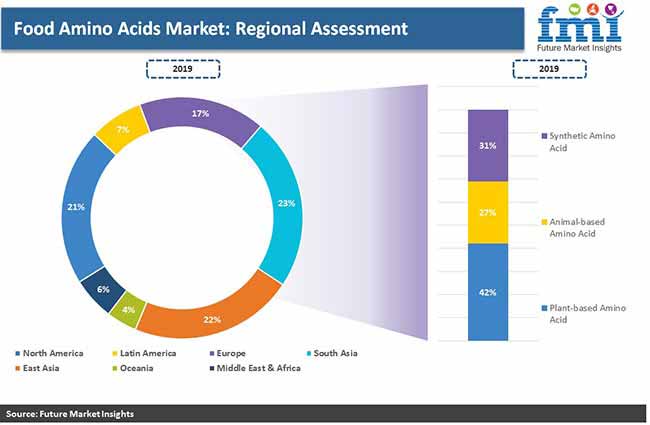The global food amino acids market size is expected to reach US$ 9.8 Bn by the end of 2029. According to a study by Future Market Insights (FMI), the market will show a steady rise at 6.2% CAGR between 2019 and 2029. According to the report, the increase in demand for amino acids for various nutraceutical and dietary supplements, owing to the health benefits offered by amino acids, is expected to fuel the demand for amino acids during the review period. The report offers a comprehensive overview of the market, covering key growth drivers, restraints, opportunities, and prevailing trends. It uses unique research methods to offer the most accurate analysis of the market.
It includes in-depth insights into the food amino acids market. Some of these are:
- The estimated value of the market was at US$ 5.4 Bn in 2019. Through the course of the report’s forecast period, the market is exhibited to show a steady pace of growth.
- Asia-Pacific region holds the largest market share followed by North America.
- The demand for dietary supplements has been increasing at a high pace among the consumers owing to the rising health awareness and increasing geriatric population in the developed economies.
- The nutraceuticals and dietary supplements is estimated to dominate the global market.
- The infant formula segment is projected to have the highest growth rate during the forecast period followed by the convenience foods segment.
“The demand for amino acids as functional foods, coupled with the rising acceptance of glutamic acid as a flavour enhancer in various foods and drinks, is likely to fuel market growth in the coming years,” said a lead analyst at FMI.
Request a report sample to gain comprehensive market insights @ https://www.futuremarketinsights.com/reports/sample/rep-gb-11235

Consumption of Dietary Supplements Likely to Increase as Consumers Look for Healthier Food Following Coronavirus Outbreak
When it comes to dietary supplements, protein stays in the top position; and amino acids are known as the building blocks of protein production. Amino acids in the human diet have been found to have several practical benefits. Glycine, for example, has been shown to enhance the quality of sleep; and leucine, for its role in muscle protein synthesis, thereby leading to longer and healthier life expectancy in the elderly.
The rise in international sporting activities has also led to increased attention being paid to the physiological effects of amino acids (BCAAs) on muscles, which is likely to provide a future market for manufacturers of amino acid ingredients. Product demand for pharmaceutical applications is projected to increase, enabling growth in the market. In addition to greater consumer buying power their focus on health and wellness as a result of the spread of coronavirus will augur well for the market.
Increasing demand for sweeteners is expected to boost demand for L-aspartic acid and phenylalanine from processed foods and ready-to-drink beverages. The emergence of microfiltration processes to increase yield is expected to provide lucrative opportunities for participants in the industry.
Contact Sales for Further Assistance in Purchasing this Report@ https://www.futuremarketinsights.com/checkout/11235
Who is Winning?
Some of the leading players operating in the food amino acids market are Kraemer Martin GmbH (Azelis), Pacific Rainbow International, Inc., CJ Corporation, Taiyo International, Monteloeder S.L., Sunrise Nutrachem Group, Kingchem LLC , Amino GmbH, Rochem International Inc., Brenntag AG, Pangaea Sciences Inc., Hugestone Enterprise Co., Ltd., Shaoxing Yamei Biotechnology Co., Ltd , Qingdao Samin Chemical Co., Ltd. , Daesang Corporation , Sigma-Aldrich, Prinova Group LLC , Evonik Industries , Ajinomoto Co., Inc., and Kyowa Hakko Kirin Group.
Via new product releases, acquisitions and investments, and agreements these businesses have improved their market position. Additionally, mergers and acquisitions continue to be a common strategy among market players. With strategic partnerships corporations plan to extend their global footprint. Methods of the biotechnology are commonly used in amino acid processing. Despite the fact that some of the amino acids cannot be produced cost effectively via biotechnology, it plays a significant role in the production of amino acids. Companies are investing in R&D activities to produce amino acid through biotechnology.
